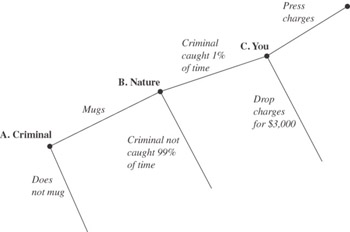Criminal Compensation
Should we let criminals purchase clemency? Say that a captured criminal offers to compensate his victim in return for the victim dropping all charges. If the victim agrees, should the government go along?
Actually, game theory shows that individuals can be too forgiving. Imagine that you have just been mugged. Trauma causes mugging victims to lose far more than just their stolen property, so assume that although the mugger got $30 from you, he caused you $9,000 worth of mental anguish. Fortunately, the mugger was caught and faces one year in jail. He offers you everything he has, say, $3,000, to drop the charges. Should you accept? Why not? If the mugger escapes his jail sentence, you are extremely unlikely to become one of his future victims. Sure, the mugger did $9,030 of damage to you, and he is offering only $3,000. If he goes to jail, however, you get nothing, so you’re better off accepting the mugger’s offer.
Unfortunately, being able to pay off victims will embolden muggers. Consequently, all decent citizens would probably be better off if we were prohibited from offering muggers compensated clemency.
Consider the game illustrated in Figure 5, where the mugger first decides whether to mug you at A. If he mugs, then nature moves at B. Nature represents the random forces of the universe that determine whether the mugger gets caught. The mugger perceives that there is a 1 percent chance that he will get caught at B. If the mugger is caught at B, then you decide at C whether to send the mugger to jail or get paid $3,000. Let’s make the likely assumption that the mugger would prefer paying $3,000 to going to jail. Thus, from the point of view of the mugger, it is more beneficial to mug you if at C you would accept the $3,000 because in the 1 percent of the time the mugger gets caught he won’t go to jail. True, if the mugger gets caught and pays you $3,000, he is worse off for having mugged you. Reducing the harm to the mugger of getting caught, however, makes the mugger more likely to strike.

Figure 5
At C you are probably better off accepting the $3,000. Since you have already been harmed, sending the mugger to jail won’t erase the trauma. Of course, ideally you wouldn’t get mugged at A.
The mugger might have attacked only because he knew it would be in your interest at C to accept the money. Thus, you might have been better off if in the beginning of the game you could credibly promise to send the mugger to jail if the game ever reached C. In the Figure 5 game this promise not to accept the mugger’s money lacks credibility. Consequently, you would benefit from a law that forbids you to drop charges in return for a monetary payment from the mugger. Players often have insufficient incentives to punish those who have done them wrong.
EAN: N/A
Pages: 260